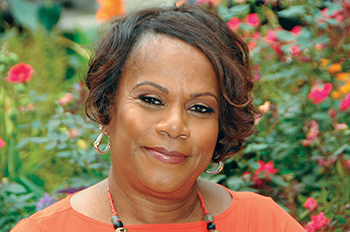By Mildred "Mit" C. Joyner, DPS, MSW, LCSW

The past year was filled with many ups and downs. In 2022, we saw the toppling of Roe v. Wade, the landmark legislation that protected a woman’s right to choose.School shootings continued to devastate families and the communities they call home. Natural disasters ravished cities and towns across the globe, taking the lives of tens of thousands and displacing hundreds of thousands from their homes.
We just faced one of the most consequential elections in our history. One may think this was just another midterm election, one where we were forced to choose between the lesser of two evils. However, there was and continues to be so much more on the line. Even as we evaluate the impact of the election, we must understand that the state of our democracy still hangs in the balance. Yet, where people mobilized, we saw rays of hope that support our democracy and our rights.
I know that as social workers it can be difficult to remain energized and motivated to tackle the problems that are plaguing our communities each and every day. You may be feeling exhausted from seeing and hearing all the volatile, divisive rhetoric designed to stoke fear in the hearts and minds of so many, but this is not the time to rest. It is in these moments, in which we are weary, that we must stand up, step forward, join with others, and rededicate ourselves to the Code of Ethics that we hold near and dear to our hearts.
We must understand that to be effective social workers and to further the vision of our profession, we have to be innovative, resourceful, proactive and hopeful. We must learn from the past and the present but also be forward-thinking so that we can be better equipped to handle the challenges of today and tomorrow. Social workers can learn from our professional knowledge and experiences, draw from our history of responding, and study data that can guide us forward. Why not use this information to ensure we are providing adequate, appropriate support to the challenges we face?
When in-person instruction resumed at schools across the nation during the COVID-19 pandemic, mask mandates were implemented to combat the spread of the virus. As an unintentional outcome of these mandates, we witnessed a decrease in the spreading of other sicknesses because the use of masks made them less easily transmittable. Now, with less masking, we are experiencing the resurgence of not only COVID-19, but also Respiratory Syncytial Virus (RSV) and the flu with serious consequences.
As climate change brings more frequent and intensive storms and natural disasters, we can use our experience, knowledge of history, and data to prepare for—and respond to—natural disasters. Have you ever thought about being in the middle of a hurricane where within in minutes, perhaps even seconds, you lose everything? You are left without any documents, identification, bank cards, or anything else. Yet, you must figure out how to start rebuilding your life.
In the state of Florida, this is a very real scenario. Recently, Hurricane Ian devastated parts of Florida, causing injuries and death and leaving thousands of Floridians homeless. Thankfully, social workers in the area were proactive in preparing for the storm, ready to provide ongoing and ever-shifting support. According to Paul C. Milford, coordinator of social work services for the school district of Lee County, “The day prior to the hurricane, models suggested the storm was going to make landfall nearly 100 miles to our north—causing many in the area not to evacuate as they typically would.” This increased the dangers for many.
As Fabio A. Naranjo, assistant professor at Barry University’s School of Social Work, shared, being prepared with comprehensive data models is vital when faced with what can be in a life-or-death situation. “I would say that our universities in general, and the schools of social work in particular, closely track approaching storms and inform students about the impending threats and challenges that we all face prior, during and after the storms or hurricanes hit us. Thus, lots of preparation with the dissemination of accurate information.”
The actions of these social worker professionals and students in Florida serve as an example for all of us on how to equip ourselves to meet challenges head-on. In the words of Liliane Souto, a graduate student at Barry University School of Social Work: “Social work taught me to see opportunities where others see chaos. It gave me the strength and competence to apply what I have learned in the classroom in real life. This experience taught me that together we are stronger.”
No matter how far removed we are from the halls of our respective schools of social work, our thirst for knowledge and the desire in our hearts to be warriors for change must never die. In 2023, let us all commit ourselves to—in the words of John Lewis—engage in some “good trouble.”
Contact Mit Joyner at president@socialworkers.org.